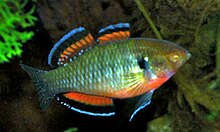Hypseleotris
| Hypseleotris | |
|---|---|

| |
| Hypseleotris compressa | |
| Scientific classification | |
| Domain: | Eukaryota |
| Kingdom: | Animalia |
| Phylum: | Chordata |
| Class: | Actinopterygii |
| Order: | Gobiiformes |
| Family: | Eleotridae |
| Genus: | Hypseleotris T. N. Gill, 1863 |
| Type species | |
| Eleotris cyprinoides Valenciennes, 1837[1]
| |
Hypseleotris is a genus of fishes in the family Eleotridae. Most are from fresh water in Australia and New Guinea, but species in fresh and brackish water are found around islands in the western Indian Ocean, southern and eastern Africa, southern and eastern Asia, and Pacific islands.[2] The largest species reaches a length of 12 cm (4.7 in).[3] They are sometimes seen in the aquarium trade; especially H. compressa. In Australia they are known as carp gudgeons.[4]
The assemblage of species of this genus which occurs in the basin of the Murray-Darling river system is made up of sexually reproducing species and hybrid lineages which consist of a single sex and which have arisen through hybridisation, a process known as hybridogenesis. The single sex species require gametes from the sexual species to reproduce and could be regarded as sexual parasites and in "closed populations" this sexual parasitism can cause the extinction of such populations.[4] It is likely that this reproduction involves androgenesis.[5]
Species
[edit]The 19 recognized species in this genus are:[3]
- Hypseleotris acropinna Thacker, Geiger & Unmack, 2022 (cryptic gudgeon)[6]
- Hypseleotris aurea (Shipway, 1950) (golden gudgeon)
- Hypseleotris barrawayi Larson, 2007[7]
- Hypseleotris bucephala Thacker, Geiger & Unmack, 2022 (boofhead carp gudgeon)[6]
- Hypseleotris compressa (J. L. G. Krefft, 1864) (empire gudgeon)
- Hypseleotris compressocephalus (W. Chen, 1985)
- Hypseleotris cyprinoides (Valenciennes, 1837) (tropical carp-gudgeon)
- Hypseleotris ejuncida Hoese & G. R. Allen, 1982 (Slender gudgeon)
- Hypseleotris everetti (Boulenger, 1895)
- Hypseleotris galii (J. D. Ogilby, 1898) (firetail gudgeon)
- Hypseleotris guentheri (Bleeker, 1875)
- Hypseleotris gymnocephala Thacker, Geiger & Unmack, 2022 (bald carp gudgeon)[6]
- Hypseleotris kimberleyensis Hoese & G. R. Allen, 1982 (Barnett River gudgeon)
- Hypseleotris klunzingeri (J. D. Ogilby, 1898) (western carp gudgeon)
- Hypseleotris leuciscus (Bleeker, 1853)
- Hypseleotris moolooboolaensis Thacker, Geiger & Unmack, 2022 (Mary carp gudgeon)[6]
- Hypseleotris pangel Herre, 1927
- Hypseleotris regalis Hoese & G. R. Allen, 1982 (Prince Regent gudgeon)
- Hypseleotris tohizonae (Steindachner, 1880)
References
[edit]- ^ Eschmeyer, William N.; Fricke, Ron & van der Laan, Richard (eds.). "Hypseleotris". Catalog of Fishes. California Academy of Sciences. Retrieved 26 July 2018.
- ^ Thacker, C.; and Unmack, P.J. (2005). Phylogeny and Biogeography of the Eleotrid Genus Hypseleotris (Teleostei: Gobioidei: Eleotridae), With Redescription of H. cyprinoides. Records of the Australian Museum, Vol. 57: 1–13.
- ^ a b Froese, Rainer; Pauly, Daniel (eds.). "Species in genus Hypseleotris". FishBase. September 2023 version.
- ^ a b Dianne J. Bray. "Hypseleotris". Fishes of Australia. Museums Victoria. Retrieved 26 July 2018.
- ^ Tanja Schwander and Benjamin P. Oldroyd (19 Oct 2016). "Androgenesis: where males hijack eggs to clone themselves". Philos Trans R Soc Lond B Biol Sci. 371 (1706). doi:10.1098/rstb.2015.0534. PMC 5031619. PMID 27619698.
- ^ a b c d Christine E. Thacker; Daniel L. Geiger; and Peter J. Unmack (27 July 2022). "Species delineation and systematics of a hemiclonal hybrid complex in Australian freshwaters (Gobiiformes: Gobioidei: Eleotridae: Hypseleotris)". Royal Society Open Science. 9 (7). Bibcode:2022RSOS....920201T. doi:10.1098/rsos.220201. PMC 9326278. PMID 35911191.
- ^ Larson, H. K. (2007). "A new species of carp gudgeon, Hypseleotris (Pisces: Gobioidei: Eleotridae), from the Katherine River system, Northern Territory". The Beagle, Records of the Museums and Art Galleries of the Northern Territory. 23: 111–118. doi:10.5962/p.287430. S2CID 130293756.
